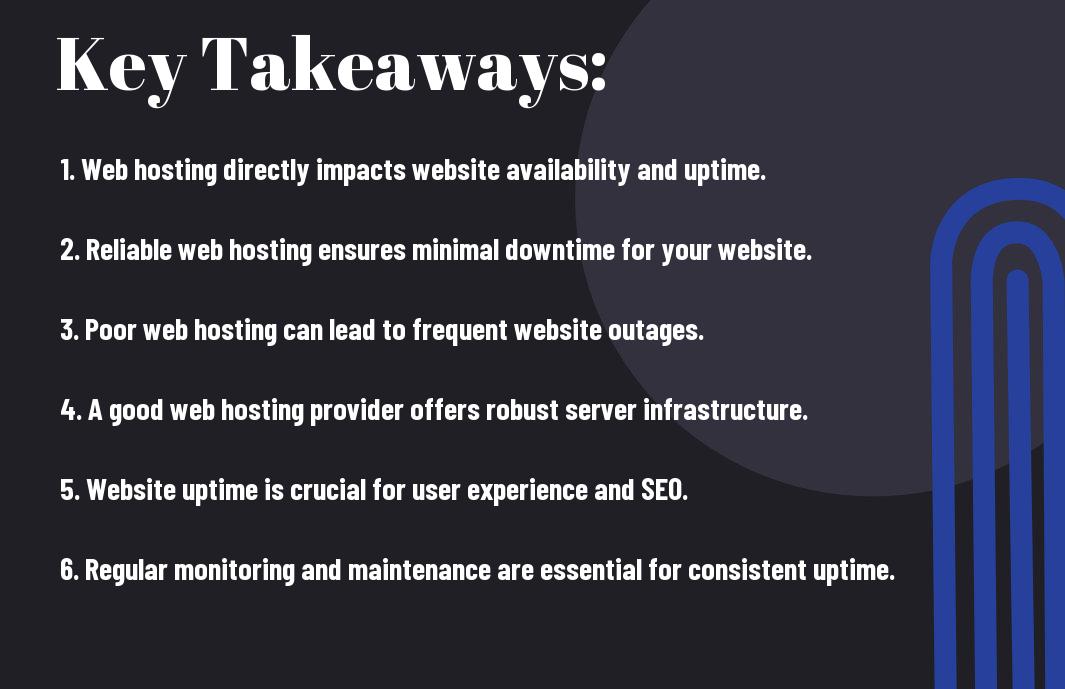When it comes to maintaining a strong online presence, website uptime is crucial. However, many website owners underestimate the direct impact of web hosting on their website’s uptime. Poor web hosting can lead to frequent website downtime, which can have detrimental effects on your online reputation and even impact your bottom line. In this blog post, we will discuss the importance of choosing the right web hosting provider for ensuring optimal website uptime. You’ll also learn about some of the key factors that can affect your website’s uptime and how to identify if your current hosting provider is putting your website at risk. By the end of this post, you will have a better understanding of how web hosting directly influences your website’s uptime and what steps you can take to ensure a reliable online presence.
Key Takeaways:
- Reliable web hosting is crucial for maintaining high website uptime. A strong web hosting provider can ensure that your website stays online and accessible to visitors, ultimately impacting user experience and search engine rankings.
- Server uptime guarantees play a significant role in web hosting. Look for providers that offer 99.9% uptime guarantees, as this can directly affect the availability of your website to users.
- Technical support and maintenance from web hosting providers are essential for minimizing downtime. Having access to a responsive and knowledgeable support team can help address any issues that may impact website uptime quickly and effectively.

Understanding Web Hosting
Any successful website needs to be hosted on a server. Web hosting is the service that makes your website accessible to the world. Without it, your website would just be a collection of files on your computer.
Types of Web Hosting Services
When it comes to web hosting, there are several types of services to choose from, each offering different levels of reliability and performance. The most common options include shared hosting, VPS (Virtual Private Server) hosting, dedicated server hosting, and cloud hosting. It’s important to consider your website’s needs and traffic levels before selecting the most appropriate option for your business.
- Shared hosting: This is a cost-effective option where multiple websites share resources on the same server. It’s suitable for small websites with moderate traffic.
- VPS hosting: This option offers more flexibility and control than shared hosting, as it allocates dedicated resources to your website.
- Dedicated server hosting: With this option, you have an entire server dedicated to your website, providing high levels of performance and control.
- Cloud hosting: This type of hosting uses multiple virtual servers to balance the load and maximize uptime.
- Managed hosting: This option allows you to focus on your website’s content and marketing, while the hosting provider takes care of technical aspects such as security and maintenance.
Though the choice of hosting type will significantly impact your website’s uptime, it’s vital to select a service that suits your website’s unique requirements and future growth.
How Hosting Affects Uptime
When it comes to website uptime, your hosting service plays a crucial role in ensuring reliability and performance. The quality of your web hosting directly affects how often your website will be available to your visitors. With an unreliable hosting provider, you may experience frequent downtime, which can negatively impact your online presence and customer experience. On the other hand, a reputable hosting provider can offer a 99.9% uptime guarantee, ensuring your website remains accessible to your audience at all times.
Factors Contributing to Website Uptime
Now, let’s delve into the various factors that contribute to website uptime. Ensuring your website remains accessible to your audience relies on several key elements. Here are some of the most crucial factors that contribute to the reliability of your website:
- Server Reliability and Maintenance
- Bandwidth and Traffic Management
- Website Security Measures
- Content Management and Updates
- Quality of DNS and Domain Management
The importance of these factors cannot be overstated. The slightest oversight in any of these areas can significantly impact your website’s uptime. The last thing you want is for your website to experience downtime, which can lead to missed opportunities and potential reputational damage.
Server Reliability and Maintenance
When it comes to server reliability and maintenance, it is essential to choose a web hosting provider that prioritizes regular hardware and software upgrades, as well as proactive server maintenance. A reliable and well-maintained server ensures that your website experiences minimal disruptions and offers a seamless experience to your visitors. The last thing you want is for your website to be affected by server failures or performance issues. This can have a detrimental impact on your website’s uptime and overall user experience.
Bandwidth and Traffic Management
Managing bandwidth and traffic effectively is crucial to maintaining optimal website uptime. Your chosen web hosting plan should be capable of handling high volumes of traffic without affecting the performance of your website. Insufficient bandwidth can lead to slow load times and potential downtime during traffic spikes, which can be detrimental to your online presence. With a robust bandwidth and traffic management strategy in place, you can ensure that your website remains accessible to your audience at all times, regardless of fluctuating levels of traffic.

Optimizing Uptime through Web Hosting Choices
For those who are looking to optimize the uptime of their website, your choice of web hosting is crucial. A reliable web hosting provider is essential for ensuring that your website remains accessible and operational for your visitors. According to The Importance of Uptime in Web Hosting: Ensuring Your …, downtime can significantly impact your business reputation and revenue potential, making it essential to make informed decisions when choosing a web hosting provider.
Selecting the Right Hosting Provider
When it comes to selecting a web hosting provider, there are several key factors to consider. You should look for providers that offer a solid uptime guarantee, ideally at least 99.9%. You should also consider the level of technical support provided, as having access to responsive and knowledgeable support can be invaluable in minimizing downtime. Additionally, consider the scalability of the hosting plans offered, as this will be crucial as your website grows and you require additional resources.
The Role of Content Delivery Networks (CDNs)
Content Delivery Networks (CDNs) play a crucial role in optimizing website uptime. By distributing your website’s content across multiple servers in different geographic locations, CDNs help to reduce latency and improve loading times, ultimately enhancing your website’s overall performance and reliability. When choosing a web hosting provider, consider whether they offer integration with a CDN or provide CDN services as part of their hosting packages.
By implementing these and other best practices, you can ensure that your website remains available and accessible to your visitors, minimizing the risk of downtime and maximizing your online presence.
Monitoring and Improving Uptime
Your website’s uptime is crucial for the success of your online presence. It directly impacts user experience, search engine rankings, and ultimately your bottom line. This is why it’s important to monitor and continuously improve your website’s uptime. To understand how your hosting provider impacts your site’s performance, check out this insightful blog post on How Your Hosting Provider Impacts Your Site’s Performance.
Tools for Uptime Monitoring
Monitoring uptime can be done through various tools and services that track the availability and response time of your website. Some tools offer real-time alerts for downtime, allowing you to take immediate action to rectify any issues. These tools not only monitor uptime, but also provide valuable insights into website performance and user experience. It’s crucial to use such tools to stay on top of any potential issues and ensure that your website is always accessible to your audience.
Strategies for Minimizing Downtime
Minimizing downtime involves implementing proactive strategies to prevent potential issues that could lead to a disruption in website availability. This includes regular maintenance, updates, and security checks to ensure that your website is always running smoothly. It’s also important to have a reliable backup system in place in case of any unforeseen events. By regularly monitoring and addressing potential issues, you can minimize the risk of downtime and keep your website running smoothly, ultimately providing a seamless experience for your visitors.
The Impact of Web Hosting on Website Uptime
With this in mind, it is crucial to understand the significant impact that web hosting can have on your website’s uptime. Choosing a reliable web hosting provider is essential in ensuring that your website remains accessible to your visitors. Factors such as server reliability, maintenance, and support can directly affect the uptime of your website. By carefully selecting a web hosting service with a strong track record of uptime performance, you can minimize the risk of potential downtime and maintain a positive user experience for your audience. It is worth investing the time and effort into finding a reputable web hosting provider to guarantee the continuous availability of your website.
FAQ
Q: What is the impact of web hosting on website uptime?
A: Web hosting significantly impacts website uptime as it determines the reliability and performance of the server where the website is hosted.
Q: How does the choice of web hosting affect website uptime?
A: The quality of web hosting directly affects website uptime. A dependable hosting provider with robust infrastructure and reliable support can ensure higher uptime for the website.
Q: What are some factors that can affect website uptime related to web hosting?
A: Factors such as server maintenance, hardware quality, network connectivity, and technical support from the hosting provider can influence website uptime.
Q: What are the consequences of poor web hosting on website uptime?
A: Poor web hosting can lead to frequent downtime, slow website loading speeds, and a negative impact on user experience and business reputation.
Q: How can website owners improve website uptime through web hosting?
A: Website owners can improve website uptime by choosing a reliable hosting provider, opting for dedicated or VPS hosting, implementing regular maintenance, and monitoring website performance closely.
CATEGORY:Web Hosting

